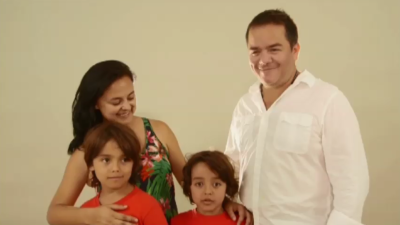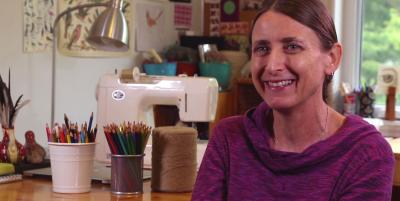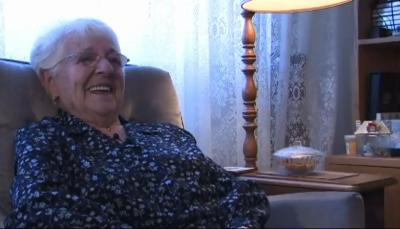Few culinary experiences can match the eclectic offerings and rapid service of a cha chaan teng (茶餐廳, “tea restaurant”).
As part of the exhibition Dialogue with Montréal’s Chinese Community, the MEM met with members of the Chinese community in Montréal. This is Edmund Chun Tin Ku and Eric Chun Wan Ku’s story.
—
Diner-style eateries called cha chaan tengs became popular in Hong Kong after World War II, when residents, who had developed a liking for British tea and biscuits, gave the combination a local twist. Menus often include breakfast sandwiches, noodle and rice dishes, and hot beverages. Edmund Ku and his two brothers, the co-owners of Montréal’s Dobe & Andy, know the cha chaan teng recipes inside out and are constantly devising ways to reinvent and update them.
A beautiful family story
Restaurant Dobe & Andy
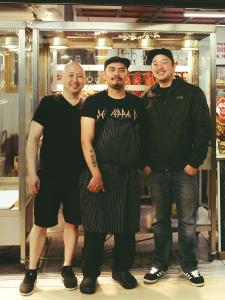
Edmund’s father, Andy Ku, came to Canada from Hong Kong in 1976 and worked as a chef at Kenny Wong’s Restaurant on the South Shore until 1982. He and his brothers soon opened their own restaurant, Feng Lin, on boulevard Saint-Laurent. When the business moved to Chinatown in 1984, they renamed it Dobe & Andy in honour of its founder and his wife. However, the restaurant’s Chinese customers still call it by its original name.
Initially Dobe & Andy served all-you-can-eat Chinese fondue for $6.50. The buffet featured a variety of vegetables, meats, and seasonal seafood. The three brothers enthusiastically participated in every step of food preparation, from washing vegetables to trimming meat. The family also introduced its famous char siu (crispy roast pork) and braised duck, inspired by the best barbecue in Hong Kong. “I think my father was a bit nuts,” laughs Edmund. “Can you imagine the amount of food that went through the restaurant every day?” he laughs.
A new direction for Dobe & Andy
Dobe & Andy
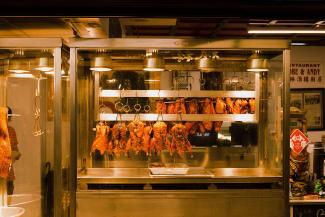
A love of fine food
Today, the Ku brothers run Dobe & Andy with their new partner, Webster Galman (from Garde Manger and Vin Papillon). Brought together by their shared passion for cooking, they apply their complementary strengths and expertise to refining the restaurant’s specialities and serving up new creations. Edmund’s favourite part of what he does is the teamwork. “I love the team we’ve built—it’s always fun to be in the kitchen,” he says. “Every day, I look forward to working and interacting with the others. It’s very satisfying.” What’s next for the restaurant? For now, Edmund would like to collaborate with other Montréal chefs to keep combining tradition and innovation.
枫林茶餐厅
「我们很荣幸继承了父亲的家族生意: 一家典型的港式茶餐厅。」
—
「我们的父亲于1976年从香港来。不久,他和他的兄弟在Saint-Laurent街开了一家餐厅,原名叫Feng Lin (枫林)。今天大多数华人仍然认识这个名字。当餐厅于1984年搬到唐人街时,为了作为纪念,父亲决定将餐厅以他自己和我们继母的名字Dobe&Andy命名。
起初,枫林(Dobe&Andy)以$ 6.50的价格供应中式自助火锅,还有我们著名的烧腊。我觉得父亲有点疯了。您能想象每天餐厅所消耗的食物量吗?
2001-2002年左右,典型的香港茶餐厅诞生了。父亲开始给我们更多责任。今天,餐厅是我们三兄弟和一个伙伴一起经营,能够继承父亲的遗产并添加了现代感,我们对此感到非常自豪。」古震宇
—
La traduction en chinois simplifié a été faite par Serena Xiong (熊吟) et révisé par Philippe Liu (刘秦宁).
楓林茶餐廳
「我們很榮幸繼承了爸爸的家族生意: 一家典型的港式茶餐廳。」
—
「我們的父親於1976年從香港來。不久,他和他的兄弟在Saint-Laurent街開了一家餐廳,原名叫Feng Lin (楓林)。今天大多數唐人仍然認識這個名字。當餐廳於1984年搬到唐人街時,父親爲了作爲紀念,決定將餐廳以他自己和我們繼母的名字Dobe&Andy命名。
起初,楓林(Dobe&Andy)以$ 6.50的價格供應中式自助火鍋,還有我們著名的燒臘。我覺得父親有點瘋了。您能想像每天餐廳所消耗的食物量嗎?
2001-2002年左右,典型的香港茶餐廳誕生了。父親開始給我們更多責任。今天,餐廳是我們三兄弟和一個夥伴一起經營,能夠繼承父親的遺產並加添了當代風味,我們感到自豪。」古震宇
—
Traductrice : Wai Yin Kwok.

